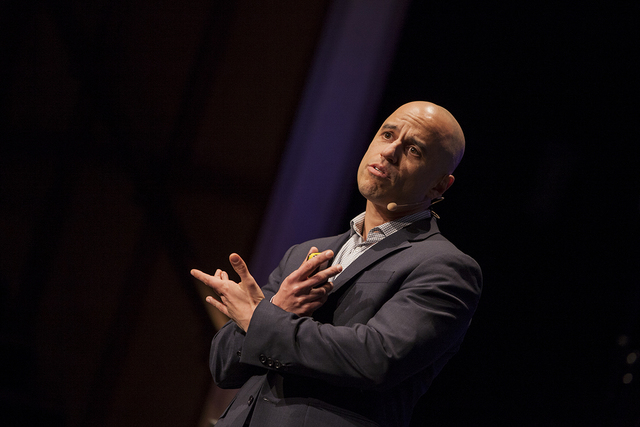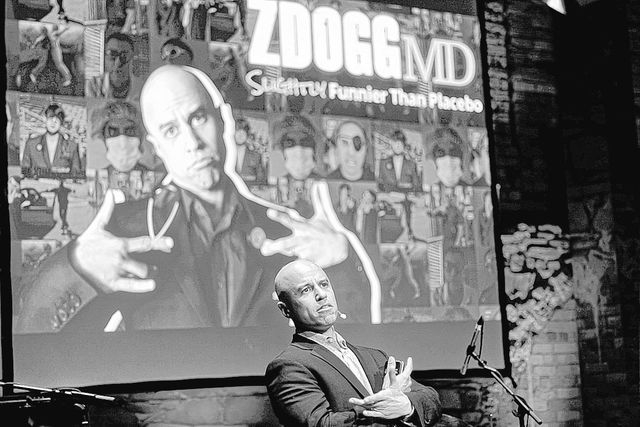Valley doctors get creative in encouraging measles vaccinations




As of Feb. 11, the Southern Nevada Health District had identified four cases of measles, the first confirmed in Clark County since 2011.
That’s small spots compared to California, where 123 cases were identified as of Feb. 20 following an outbreak that began in December at Disneyland.
Measles can lead to pneumonia, encephalitis, seizures and even death.
“Some people think of measles as just a little rash and fever that clears up in a few days, but measles can cause serious health complications, especially in children younger than 5 years of age,” said a Centers for Disease Control and Prevention information sheet for parents. “There is no way to tell in advance the severity of the symptoms your child will experience.”
CDC statistics show that about one in four people in the U.S. who get measles will be hospitalized. About one out of every 1,000 people with measles will develop brain swelling, which can lead to brain damage, and about one or two out of every 1,000 people die, even with the best medical care. Most people are protected against the disease because the majority of those born before 1957 had measles in childhood, and younger people are routinely vaccinated against it.
Before the measles vaccine program started in 1963, the CDC estimates 3 to 4 million people got measles every year in the U.S. Of those, 48,000 were hospitalized, 4,000 developed encephalitis or brain swelling and 400 to 500 died.
Two doses of the MMR vaccine, which inoculates against measles, mumps and rubella, are suggested — the first dose between 12 and 15 months and the second dose before the child enters elementary school, at ages 4 to 6.
Nevada children are required to be immunized before attending school or a licensed child care facility unless they get an exemption for religious beliefs or if a doctor determines the health of the child makes immunization too risky.
But what about children who aren’t in school or child care? Babies younger than 12 months and older children who don’t stick to the immunization schedule are at risk of being infected.
“Measles is a highly contagious virus that lives in the nose and throat mucus of an infected person,” said a CDC fact sheet. “It can spread to others through coughing and sneezing. Also, measles virus can live for up to two hours on a surface or in an airspace where the infected person coughed or sneezed. If other people breathe the contaminated air or touch the infected surface, then touch their eyes, noses or mouths, they can become infected. Measles is so contagious that if one person has it, 90 percent of the people close to that person who are not immune will also become infected.”
Plus, measles can be spread about four days before the telltale rash appears and up to five days after.
With risks like that, why doesn’t everyone get immunized? For some, skipping or delaying vaccines is unintentional. Local pediatricians offices do what they can to help.
Nicki Mazzone was named the 2014 Outstanding Immunization Champion by the Southern Nevada Immunization & Health Coalition for her work encouraging immunizations at Centennial Pediatrics. Mazzone said Centennial Pediatrics uses constant patient contact to keep kids on track. The office compiles lists of patients who are due for immunization and then reaches out to parents with postcards, personal calls and text messages. If children are brought in for any kind of visit, as long as they’re not too sick, parents are encouraged to take the opportunity to catch them up.
Some parents skip or delay their child’s MMR inoculations because they believe the vaccination may be tied to autism.
“Many studies have looked at whether there is a relationship between vaccines and autism spectrum disorder,” said a CDC topic sheet. “To date, the studies continue to show that vaccines are not associated with autism spectrum disorder.”
Dr. Zubin Damania, founder and CEO of Turntable Health, a membership-based primary care practice in downtown Las Vegas, believes part of the reason parents choose to skip shots is because families aren’t developing trusting relationships with pediatricians.
“What I think this controversy represents is a failure in the way we do health care,” Damania said.
He said that with many doctors able to spend only 10 to 15 minutes with patients, they don’t have the time to establish trust. So parents go to the Internet, social media and celebrities to develop their opinions.
“Vaccines are safe and effective,” Damania said. “As physicians, we fail to communicate that, and it’s on us.”
Damania turns to his alter-ego ZDoggMD to use rap and satire as a vehicle to change people’s minds on YouTube. While a doctor might spout CDC statistics, Damania said he can be ironic, sarcastic, funny and engaging.
“The advantage of having a character like ZDogg is that I can go and say some things that a doctor would have some hesitancy to say because we’re trained to be professional. I can ridicule or say things are crazy. It gives me a platform to reach out on the same level as celebrities.”
Celebrity “anti-vaxers” have taken much of the flack for reductions in vaccination rates. One of the most often mentioned is Jenny McCarthy. In 2007, McCarthy’s book “Louder Than Words” speculated that her son’s autism may have been linked to the MMR vaccine.
Las Vegas entertainers Penn & Teller responded to anti-vaxers in their Showtime series in 2010 with a bit that has recently gone viral on the Internet.
“What I love about that video is they’re rationalists,” Damania said. “They say even if it causes autism, which it doesn’t, here’s why you should do it.”
McCarthy said in a May 14, 2014, Chicago Sun-Times opinion column that for years she has been “wrongly branded as anti-vaccine” when what she really wanted was an alternative schedule allowing for one shot per doctor’s visit. She said it was never her intention to see vaccines eliminated.
Still, conspiracy theories persist, with many parents convinced that doctors encourage immunizations because they’re being paid by the drug companies.
“I get paid never by a drug company,” Damania said. “I wish they would pay me. I have gotten not a dime.”
Damania said physicians lose money on immunizations, but they continue to provide and encourage them because it’s the right thing to do, medically and morally.
For more information on the measles risk in Southern Nevada, visit southernnevadahealthdistrict.org. For national information, visit cdc.gov/measles. To access the Nevada immunization records registry, visit izrecord.nv.gov. To check out ZDoggMD’s public health videos, visit zdoggmd.com.
Contact View contributing reporter Ginger Meurer at gmeurer@viewnews.com. Find her on Twitter: @gingermmm.


















